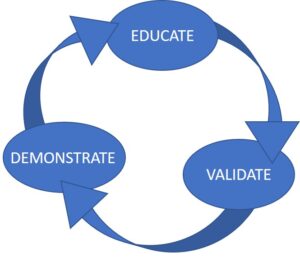
The Model 3 Method differs in important ways from traditional prevention-focused curricula. Rather than building the program around a comprehensive knowledge set that students must master to “complete the course,” it focuses instead on guiding students through a learning path that maximizes the likelihood they will make real-world choices that lead to “favorable outcomes.” In other words, the primary student outcome we are seeking is to increase the odds that students will Make Better Choices in real-world situations.
To achieve this outcome, we take the position that “education” alone is not enough. Instead, the Model 3 Method takes a three-pronged approach – Educate, Validate, and Demonstrate.
Our approach to EDUCATING is guided by three principles:
In addition to educating, we teach students to VALIDATE:
Third, we encourage students to DEMONSTRATE their learning through:
[1] Our pedagogical approach is informed by the work of Blake Richards and Paul Frankland, as described in “Why Students Forget – And What You Can Do About It” [https://www.edutopia.org/article/why-students-forget-and-what-you-can-do-about-it]